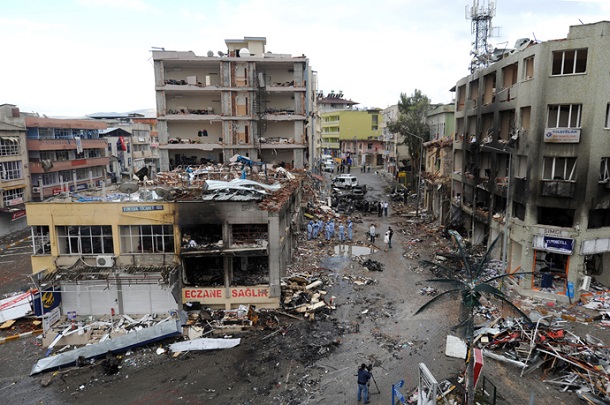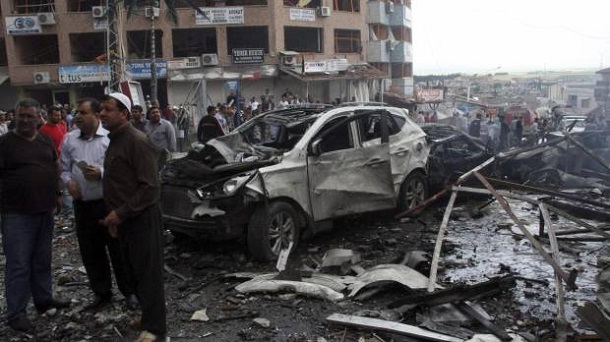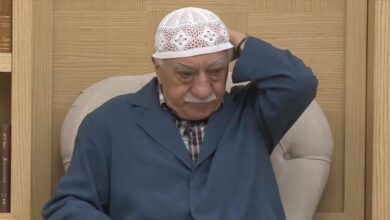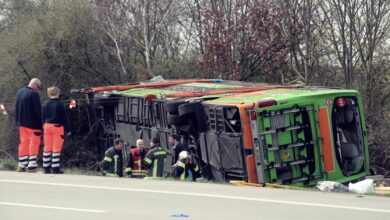Turkish police say that nine people have been arrested in connection with Saturday’s attacks in Reyhanli,but Western analyst said the attacks were designed to drive a war between Turkey and Syria.
Turkish Prime Minister Recep Tayyip Erdogan said Turkey would not be dragged into a “bloody quagmire”.
He called on Turks to be “extremely careful, extremely vigilant… in the face of provocations”.
“We will not be trapped. The aim of these attacks is to pit Turks against each other and create chaos. So I call on all my citizens to keep calm.”
The Turkish government said on Sunday that the number of people killed in the blasts had risen to 46 and that more than 50 others were still being treated in hospital.
All nine of those arrested in connection with the attacks were Turkish citizens, officials said.
Information Minister Omran al-Zoubi told a news conference on Sunday his country “did not commit and would never commit such an act because our values would not allow that”.
Mr Zoubi said that “it is not anyone’s right to hurl unfounded accusations”.
“We were saddened by the martyrs’ deaths” [on] Saturday in the town of Reyhanli,” he said.
“It is (Turkish Prime Minister Recep Tayyip) Erdogan who should be asked about this act. He and his party bear direct responsibility.”
Mr Zoubi also launched what correspondents say was one of the harshest personal attacks on Turkey’s prime minister by an Syrian official so far. He demanded that Mr Erdogan “step down as a killer and as a butcher”.
The BBC’s Jim Muir in Beirut says that it was a robust response from Damascus, throwing responsibility for the blasts firmly back on the Turkish authorities.
Mr Zoubi said it was the Turkish government that had facilitated the flow of arms, explosives, vehicles, fighters and money across the border into Syria.
There are also reports that sections of the American military and intelligence bureaucracies are considering double-crossing Al Qaeda-affiliated forces in Syria, such as the Al Nusra Front, which have until now served as the US-backed opposition’s shock troops.
A leader of a US-backed opposition militia inside Turkey told the UAE’s The National that US officials were considering mounting drone strikes inside Syria to massacre Al Nusra forces. He cited the US officials as saying, “I’m not going to lie to you. We’d prefer you fight Al Nusra now, and then fight Assad’s army. You should kill these Nusra people. We’ll do it if you don’t.”
This debate is intensified by the manifest failure of the US-backed opposition militias, who have very limited popular support, to topple the Assad regime, despite all the assistance they have received from US imperialism and its allies. With forces of the Lebanese Shiite militia Hezbollah now intervening to support Assad, there is a risk that the US-backed opposition could suffer a catastrophic defeat. There are also reports that Assad could receive further military support from Iran and Russia.
After more than two years of civil war, fomented by the US and its allies, the crisis in Syria appears to be coming to a head. Amid a vast crisis threatening a devastating regional war, the American ruling class is threatening to respond with yet more military violence.
In a recent Washington Post op-ed, Anne-Marie Slaughter—a Princeton professor who is a leading proponent of “humanitarian intervention” and Obama’s chief policy planner at the State Department from 2009 to 2011—wrote that “US credibility is on the line.” From the standpoint of such forces in the US foreign policy establishment, the failure to topple Assad, who has Russian and Chinese backing, would be an unacceptable blow to US efforts to establish its global geo-strategic dominance.
“It comes down to an existential struggle,” said Salman Shaikh of the Brookings Doha center think-tank. “Those who oppose Assad really have to show that they mean it now.”
The Syrian opposition coalition has added its voice to the Turkish accusations that Damascus was behind the bombings, saying it was a blatant attempt to drive a wedge between Turkey and the thousands of Syrian refugees who have been given shelter on the Turkish side of the border.
The West swiftly denounced the attacks. French President Francois Hollande condemned them “in the strongest possible terms,” and U.N. chief Ban Ki Moon said the perpetrators must be “brought to justice.”
The Syrian opposition National Coalition said the attacks were designed to drive a wedge between Turks and Syrians.
“The coalition sees these heinous terrorist acts as an attempt to take revenge on the Turkish people and punish them for their honorable support of the Syrian people,” it said in a statement. The bombings were “a desperate and failed attempt to sow discord.”
In northern Syria, rebels took over two army posts on a desert road that serves as an alternate route into the city of Aleppo after days of fighting, said Rami Abdul Rahman, who heads the Syrian Observatory for Human Rights.
The regime built the desert road to bypass contested areas after rebels captured the town of Maaret al-Numan in October, cutting the main highway between Aleppo and Damascus.
Meanwhile, state TV said government troops were able to secure the highway linking Damascus with the southern city of Daraa, where the uprising against Assad’s regime began more than two years ago.
[adrotate group=”15″]


 FETO terror group’s ringleader Fetullah Gulen dies: FETO sources
FETO terror group’s ringleader Fetullah Gulen dies: FETO sources Heatwave: Türkiye is roasting!
Heatwave: Türkiye is roasting! Flixbus accident on A9: Five dead, many injured – hospitals alerted
Flixbus accident on A9: Five dead, many injured – hospitals alerted Court temporarily stops Assange’s extradition
Court temporarily stops Assange’s extradition